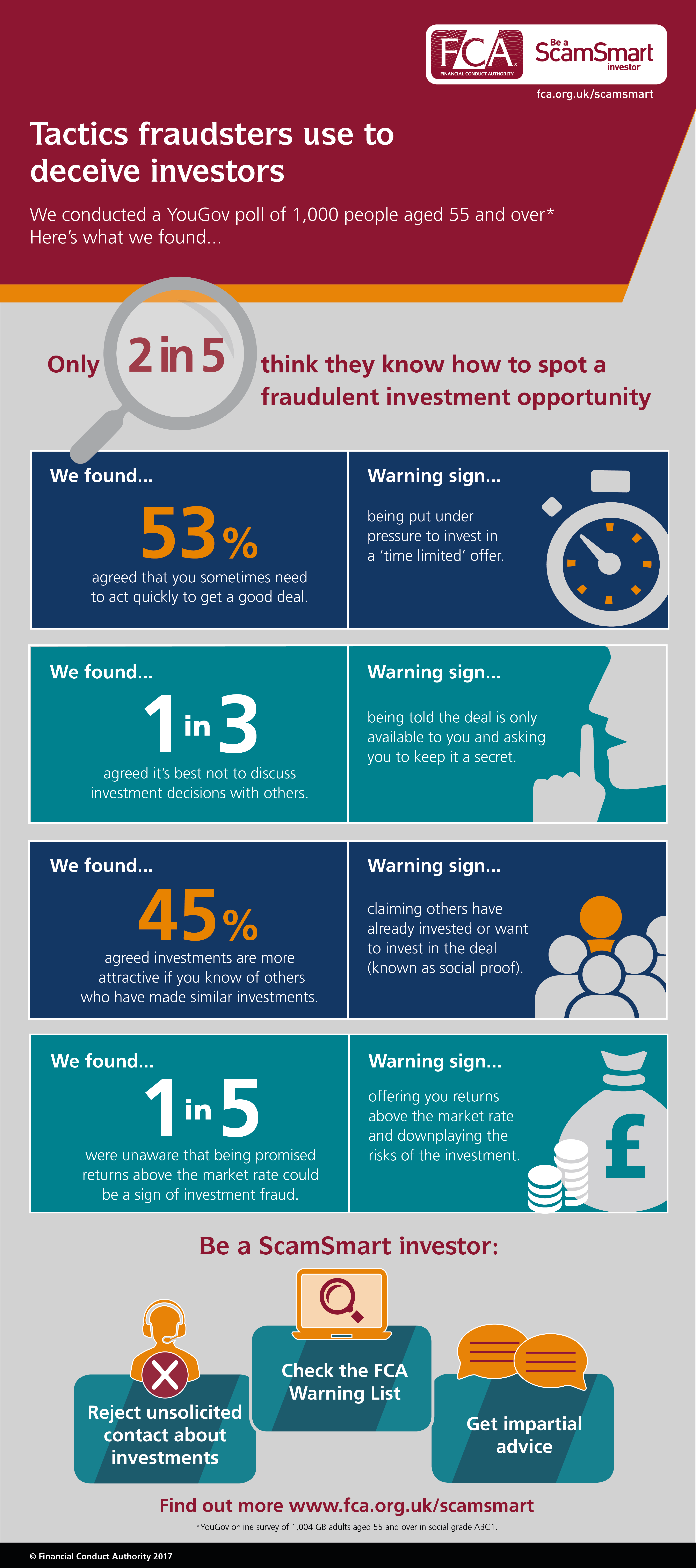- Only two in five think they know how to spot an investment scam
- Half of over 55s surveyed agree you need to act quickly to get a good deal, an attitude exploited by fraudsters who offer time-limited deals
- A third of over 55s surveyed are reluctant to discuss their investment decisions with others, something that is seized on by fraudsters who encourage them to keep their offer a secret
The Financial Conduct Authority (FCA) is urging over 55s to check investment opportunities are genuine before they part with their money. This comes as new research*, commissioned as part of the FCA’s ScamSmart campaign, reveals that only two in five (42%) think they know how to spot a fraudulent investment opportunity. Fraudsters are targeting the growing over 55 population because they are more likely to have money to invest.
Last year, victims of investment fraud lost on average £32,000** as fraudsters employed increasingly advanced psychological tactics to persuade victims to invest. One of the most common methods used by fraudsters is to pressurise potential investors to make a quick decision on a time-limited investment offer. This new research found that more than half (53%) of the over 55s surveyed believed acting quickly can be key to getting a good deal, demonstrating how many could be vulnerable to this tactic.
A third (34%) said it is best not to discuss investment decisions with others and fewer than half (48%) said they would be likely to seek impartial advice before making an investment. These attitudes are seized on by fraudsters, who often urge their target to keep the offer a secret, in order to prevent others from dissuading them from investing.
45% of over 55s surveyed agreed that investment opportunities are more attractive if you know of others who have made similar investments. Fraudsters may exploit this by saying that others want in on the deal or have already benefitted.
Interestingly, those surveyed were more aware of certain signs of investment fraud, but less aware of others. For example, 92% agreed being contacted out of the blue could be a warning sign, but 19% were unaware that being promised returns above the market rate could also be a tactic.
The common tactics used by fraudsters include:
- Offering lucrative returns above the market rate and downplaying the risks of the investment
- Using flattery to make potential victims feel good, such as praising them for being a knowledgeable investor
- Saying that the deal is only available to the target and asking them to keep it a secret
- Saying that other clients have invested or want in on the deal (known as ‘social proof’)
- Putting them under pressure to invest in a time-limited offer
The FCA is urging consumers to be sceptical and cautious before they invest their money. If someone invests their money with an unauthorised firm then they will have no protection from the Financial Ombudsman Service or Financial Services Compensation Scheme if things go wrong.
To avoid being a victim of investment fraud, the FCA advises consumers to, at the very least:
- Reject unsolicited contact about investments
- Before investing, check the Financial Services Register to see if the firm or individual you are dealing with is authorised and check the FCA Warning List of firms to avoid
- Get impartial advice before investing
Mark Steward, Director of Enforcement, FCA, comments:
“Be alert to the warning signs like being contacted out of the blue, promises of low risk and/or guaranteed above market returns, special deals just for you, time pressure and, very often, flattery.
Be vigilant. Don’t let them push you into making a decision and parting with your money. Question their claims. Check the Financial Services Register and seek impartial advice. If in any doubt – don’t invest.”
Nick Hewer, who is supporting the campaign, added:
“As someone who has been approached by scammers myself, I know how hard it is to identify whether an investment offer is legitimate. They’re very clever these people, playing psychological games to win over the trust of often vulnerable victims and that’s why I’m working with the FCA to raise awareness of this troubling issue.
“Remember, if it sounds too good to be true then it probably is. If you are offered an attractive investment out of the blue, be suspicious, check the FCA’s Warning List and seek impartial advice. Better still, if you get a cold call, just put the phone down!”
Notes to editors
- *All figures, unless otherwise stated, are from YouGov Plc. The total sample size was 1,004 GB adults aged 55+, in social grade ABC1, with a gross household income of £30,000+ and/ or savings of £5,000+. Fieldwork was undertaken between 27 January to 6 February 2017. The survey was carried out online.
- **Figures from Action Fraud released in October 2016
- In the last six months (July 2016 – January 2017) the FCA received 2,748 reports of scams or unauthorised firms to its website.
- In 2016, the FCA received 261,547 visitors to the ScamSmart website.
- On 1 April 2013, the FCA became responsible for the conduct supervision of all regulated financial firms and the prudential supervision of those not supervised by the Prudential Regulation Authority (PRA).
- The FCA has an overarching strategic objective of ensuring the relevant markets function well. To support this it has three operational objectives: to secure an appropriate degree of protection for consumers; to protect and enhance the integrity of the UK financial system; and to promote effective competition in the interests of consumers.
- Find out more information about the FCA.

